Resources
An undergraduate liberal arts education can help students be not simply shaped by tradition but also shapers of tradition. Specifically, undergraduate theological education, aimed at ministry preparation in a liberal arts setting, can seek to graduate students who are responsible shapers of the traditions that shape them, that is, who are tradents. The work of a tradent involves active engagement that requires skills and capacities well beyond simply passing on the past formulations of a tradition. The pedagogical question, then, is how to engage in undergraduate theological education if this image of the tradent is what we have in mind for our students. Three aspects of this image can serve as pervasive or recurrent themes across the structure of a major or program. One aspect is the interpretive nature of the tradent's work, a second is facility with traditions, and a third is the creative, constructive work of thinking theologically. Whatever particular traditions characterize a department's context, the image of students as tradents can help focus pedagogical reflection on the department's work: teaching students as shapers of the traditions that shape them.
The essays collected in this manuscript respond to “How We Teach Introductory Bible Courses: A Comparative and Historical Sampling” by Collin Cornell and Joel M. LeMon, published in this issue of the journal.
The millennial generation is distinctive for several reasons, not the least is its growing religious disaffiliation. Given a growing disinterest in religion in general and the Bible in particular especially among the fast growing group of millennial “nones” how can biblical studies classes still be seen as appealing and relevant? This article seeks to answer this question by examining the identity and concomitant values of millennials. As a result of this analysis I argue that while the Bible as inherent authority may be quickly losing its appeal, the Bible as an example of human creativity, group reflection, political rhetoric, and social discourse makes the study of the Bible particularly relevant for millennials contemplating careers in the global marketplace even if the importance of the Bible itself is waning for this generation. I show how in my introductory New Testament class I attempt to implement these ideas.
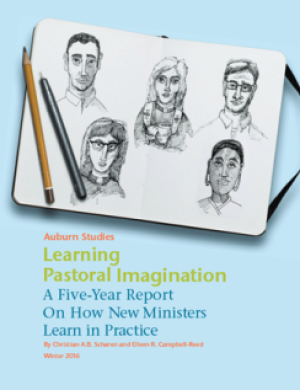
To lead with courage and pastoral wisdom in the twenty-first century requires ministers to make a transition from simply imagining ministry to embodying pastoral imagination. The relational and embodied capacity for ministry, what Craig Dykstra first called pastoral imagination, emerges over time and remains indispensable for effective pastoral leadership in congregations and community ministries. We find through listening to ministry leaders across the country that ministry today is less about exercising the authority of an office or role and more about embodying an authentic contextual wisdom only gained by daily practice of leadership on the long arc of learning ministry. Yet few studies of learning over time have been conducted, leading to this unique, broadly ecumenical, and national study of learning ministry in practice. In this five-year report, we describe the experiences of a cohort of 50 diverse ministers from across the United States, recruited from 10 theological schools ranging from Pentecostal to Eastern Orthodox and coming from many different denominational traditions. This study deepens engagement of Auburn research on patterns of teaching and learning in theological education, offering a dynamic view into the formation of faith leaders for the twenty-first century. (From the Publisher)
This study identifies the dominant modes of biblical interpretation being taught in introductory Bible courses through a qualitative analysis of course syllabi from three institutional contexts: evangelical Christian colleges, private colleges, and public universities. Despite a proliferation of methods and scholarly approaches to the Bible, this study reveals that historical-critical approaches continue to predominate in pedagogical contexts, especially private colleges and public universities. In Christian colleges, theological approaches appear more frequently, usually alongside historical criticism and rarely supplanting it. The study also shows that teachers have been deploying social scientific and ideological approaches with increasing frequency over the past decade. Additionally, the study tracked instruments of student assessment in these courses. Public universities showed a particularly high level of pedagogical conservatism in this regard, while Christian colleges exhibit the greatest diversity with respect to course assignments and evaluations. See also “Response to ‘How We Teach Introductory Bible Courses’” by Caryn A. Reeder, Tat-siong Benny Liew, Jane S. Webster, Alicia J. Batten, and Chris Frilingos, published in this issue of the journal. The complete data set is included in an extended Appendix at the end of the article, and is also available electronically on the “Supporting Information” tab of the article's webpage and at the Wabash Center (http://www.wabashcenter.wabash.edu/pdfs/AppendixCornellandLeMon.pdf).
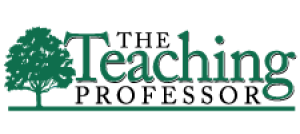
Journal Issue.
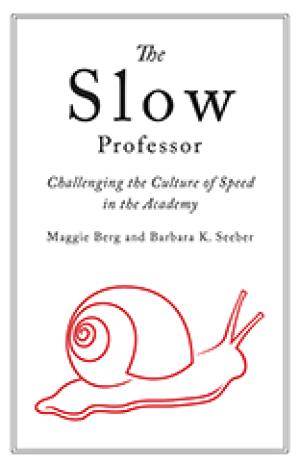
Click Here for Book Review Abstract: If there is one sector of society that should be cultivating deep thought in itself and others, it is academia. Yet the corporatisation of the contemporary university has sped up the clock, demanding increased speed and efficiency from faculty regardless of the consequences for education and scholarship. In The Slow Professor, Maggie Berg and Barbara K. Seeber discuss how adopting the principles of the Slow movement in academic life can counter this erosion of humanistic education. Focusing on the individual faculty member and his or her own professional practice, Berg and Seeber present both an analysis of the culture of speed in the academy and ways of alleviating stress while improving teaching, research, and collegiality. The Slow Professor will be a must-read for anyone in academia concerned about the frantic pace of contemporary university life. (From the Publisher)
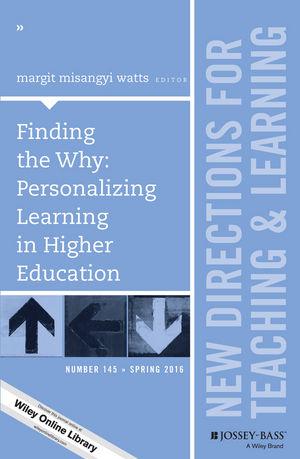
Click Here for Book Review Abstract: This volume addresses how we might help students find the “why” of their educational endeavors. The ideas found in this volume range from: - changing the perceptions and attitudes of whole communities toward education, - retuning the first year experience to give students more opportunities to find meaning in their learning, - suggesting new ways of integrating students’ experiences with their learning in core courses, and - connecting major initiatives already in place to demonstrate how we might restructure undergraduate education through the content of the curriculum, the way we teach, and our curricular learning experiences. This is the 145th volume of this Jossey-Bass higher education series. It offers a comprehensive range of ideas and techniques for improving college teaching based on the experience of seasoned instructors and the latest findings of educational and psychological researchers. (From the Publisher)
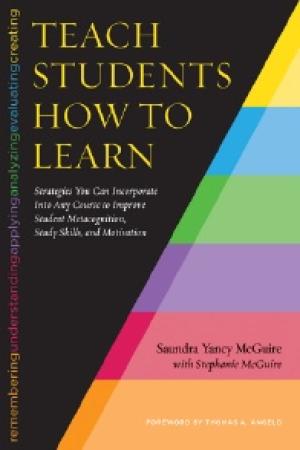
Click Here for Book Review Abstract: Miriam, a freshman Calculus student at Louisiana State University, made 37.5% on her first exam but 83% and 93% on the next two. Matt, a first year General Chemistry student at the University of Utah, scored 65% and 55% on his first two exams and 95% on his third—These are representative of thousands of students who decisively improved their grades by acting on the advice described in this book. What is preventing your students from performing according to expectations? Saundra McGuire offers a simple but profound answer: If you teach students how to learn and give them simple, straightforward strategies to use, they can significantly increase their learning and performance. For over a decade Saundra McGuire has been acclaimed for her presentations and workshops on metacognition and student learning because the tools and strategies she shares have enabled faculty to facilitate dramatic improvements in student learning and success. This book encapsulates the model and ideas she has developed in the past fifteen years, ideas that are being adopted by an increasing number of faculty with considerable effect. The methods she proposes do not require restructuring courses or an inordinate amount of time to teach. They can often be accomplished in a single session, transforming students from memorizers and regurgitators to students who begin to think critically and take responsibility for their own learning. Saundra McGuire takes the reader sequentially through the ideas and strategies that students need to understand and implement. First, she demonstrates how introducing students to metacognition and Bloom’s Taxonomy reveals to them the importance of understanding how they learn and provides the lens through which they can view learning activities and measure their intellectual growth. Next, she presents a specific study system that can quickly empower students to maximize their learning. Then, she addresses the importance of dealing with emotion, attitudes, and motivation by suggesting ways to change students’ mindsets about ability and by providing a range of strategies to boost motivation and learning; finally, she offers guidance to faculty on partnering with campus learning centers. She pays particular attention to academically unprepared students, noting that the strategies she offers for this particular population are equally beneficial for all students. While stressing that there are many ways to teach effectively, and that readers can be flexible in picking and choosing among the strategies she presents, Saundra McGuire offers the reader a step-by-step process for delivering the key messages of the book to students in as little as 50 minutes. Free online supplements provide three slide sets and a sample video lecture. This book is written primarily for faculty but will be equally useful for TAs, tutors, and learning center professionals. For readers with no background in education or cognitive psychology, the book avoids jargon and esoteric theory. (From the Publisher)
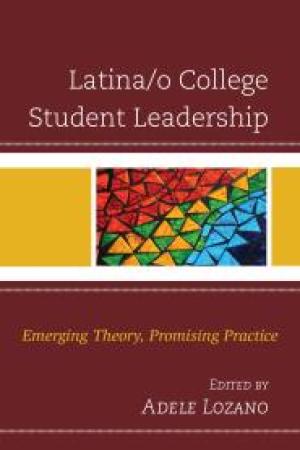
Latina/o College Student Leadership: Emerging Theory, Promising Practice examines Latina/o college student leadership and leadership development in higher education. This edited collection examines emerging frameworks, empirical research, leadership models, essays, and promising practices from the perspectives of scholars, educators, practitioners, and activists. Latina/o student leadership is analyzed through the lens of various institutional contexts (e.g. large research institution, community college, Hispanic-serving institution) as well as diverse intra-institutional contexts (e.g. academic, student organizations, student government, fraternities and sororities). The focus on theory and practice within various contexts, combined with an emphasis on student voice, helps provide deeper insight into how Latina/o students experience leadership in higher education, as well as how to promote and support the leadership development of Latina/o college students. (From the Publisher)
Wabash Center Staff Contact
Sarah Farmer, Ph.D
Associate Director
Wabash Center
farmers@wabash.edu